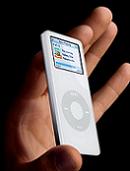Brazil pays a hefty price for iPods
 Having already stormed world fashion, Apple's hip iPod music player is finally making its presence felt in global currency markets.
Having already stormed world fashion, Apple's hip iPod music player is finally making its presence felt in global currency markets.
One of Australia's biggest banks, the Commonwealth Bank, has used the latest version of Apple's music player -- the slimline nano -- to compare global currencies and purchasing power in 26 countries.
Along the lines of the Big Mac index launched 20 years ago by The Economist magazine, the survey prices the 2GB nano in US dollars and found that Brazilians pay the most for an iPod, shelling out $327.71, well above second-place India at $222.27.
Canada was the cheapest place to buy a nano, at $144.20, while Australia ranked 19th at $172.36, cheaper than the UK ($195.04), Germany ($192.46), France ($205.80), South Korea ($176.17) and China, where the machine is manufactured. The US was fourth-cheapest, at $149.
"Interestingly, especially with freight costs close to zero, China is middle-ranked, in terms of global prices, at $179.84," Craig James, the chief equities economist at Commonwealth Bank, told Reuters.
Purchasing-power parity surveys compare the prices of goods in different countries and at their simplest level can help show whether one currency is undervalued against another.
James said the results suggested that the US currency had scope to rise against a range of major currencies except for the Hong Kong and Canadian dollars, or the Japanese yen.
The results, however, could be influenced by different pricing policies that Apple might apply in different parts of the world, James said.
"The results of the CommSec iPod index won't provide joy to US policy makers. They want the Chinese yuan to appreciate, not fall in value against the US dollar," he said.
More than 21 million iPods were sold in the last quarter.
(Published by CNET, January 19, 2007)